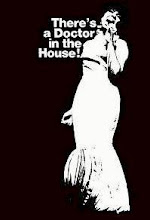| Peacock LP # 151 back cover |
»Call Him Up« (»... I got a telephone in my bosom, I can call him up on my own ...«) is known under many titles: »Jesus On The Mainline« or »Go Tell Him What You Want«; The Caravans (feat. Albertina Walker) recorded this song as »Tell Him What You Want« (States # 154). Parts of the lyrics also crop up in Richie Valens's Woodstock performance of »Free- dom«, since he had sung gospel back in the '50s in Brooklyn (read more about it here: Denise Sullivan: Keep On Pushing. Black Power Music from Blues to Hip-Hop, Chicago 2011, p. 101 ff.). On the Peacock LP, the song is credited to »E. Franklin« (i.e. Er- mant Franklin, I presume) what is weakly justified by the fact that the song as performed by the Clouds is not exactly identical to any other version I know of (there are myriads, though). The song was for the first time recorded in the late '30s, but the peculiar charm of the lyrics hasn't worn off. - Read also the postscript.
»He's Real To Me« is likewise a standard tune and usually credited as traditional. It's one of the songs on this LPs where you can hear the Clouds backing the lead singer (or actually the lead sermonizer) with falsetto voices. Best I leave you now to the songs with the nice headline you find on many a Peacock LP above the song list: Your Program For This Performance! And here it is. Happy Sunday all!
Mighty Clouds Of Joy: »Call Him Up« / »He's Real To Me« from the Peacock LP # 151 (1968?):
On the Melting Pot blog, you'll find a thoughtful review of the 3-CD set Fire in My Bones: Raw + Rare + Otherworldly African-American Gospel (1944-2007) released in Oct. 2009 (get info here). This review (read it here) is pertinent to topics often raised in this blog of mine, viz. the question concerning the relation between pop (secular) music and gospel and, a closely related point, how (and whether) to appre- ciate gospel music with or without regard to its sacred character. In addition, there are interesting remarks about the song »Call Him Up« aka »Telephone In My Bo- som«. I would like to quote here some passages from this review:
It’s the sacred character I’d argue that sets many of these performances above the standard fare produced in similar times. There’s a feeling in these performances that is shared in other sacred musics, but not as readily found in more secular, popular sounds (except not surprisingly when artists come from the Church, i.e. Aretha Franklin, Sam Cooke, Donny Hathaway, etc, etc, etc.). However you want to appreciate this music, what’s most important is that you DO experience it. Regardless of your own religious belief or feeling, this music is deserving of your attention and your ears will be richly rewarded once you delve into this fine set.
For those of you into Gospel Funk, there are plenty of choices here too. Lula Collins’ “Help Me” from 1973, is a track that could have just as easily ended up on obscure Tennesee funk comp. by itself. Aside from some relatively minimal religious references, it is easy to take this song on very secular terms. That’s a more difficult task with a song like “Telephone In My Bosom,” from the Amazing Farmer Singers of Chicago. While the sound has a bit of Sly & Funkadelic, the lyrics keep you focused on the sacred, which is, after all, the true point of this music. You can appreciate it simply on its sonic merits, because it’s very funky, it rocks, it swings, is deeply soulful or just has a certain sound. But it’s very important to understand the context this music was recorded and to remember that even at its most rockin’ it remains sacred music.






.jpg)










No comments:
Post a Comment